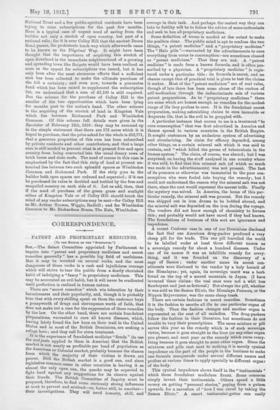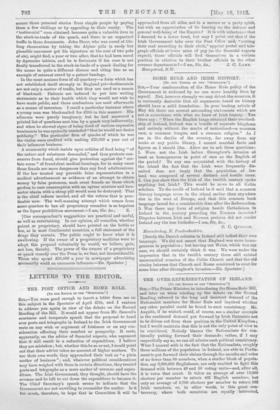CORRESPONDENCE.
PATENT AND PROPRIETARY MEDICINES. [To TRIM EDITOR, 01 T1111 "SPECTATOR:') Sra,—The Select Committee appointed by Parliament to inquire into "patent and proprietary medicines and secret remedies generally" has a possible big field of usefulness. But it may be wrecked on several rocks, and the most dangerous of those rocks is a rash and injudicious courage which will strive to tear the public from a dearly cherished habit of indulging a "fancy" in proprietary medicines. This may be accounted an evil habit, but it will never be eradicated until perfection is realized in human nature.
There are "secret remedies" which win toleration by their harmlessness and their popularity, and, though it is probably true that with every shilling spent on them the customer buys a pennyworth of drugs and elevenpence worth of faith, that does not make out a case for the suppression of these remedies by the law. On the other hand, there are certain fraudulent preparations, warranted to cure all known diseases, which, having lately found the law keen on their trail in the United States and in most of the British Dominions, are seeking a refuge here ; and they call for stern treatment. It is the experience of fraudulent medicine " fiends " (to use the mot lusts applied to them in America) that the British market is not nearly as profitable per head of population as the American or Colonial market, probably because the classes from which the majority of their victims is drawn are poorer. Still the British market is a good one, and since legislative common sense in other countries is leaving it as almost the only open one, the quacks may be expected to fight hard against any suggestions for its closure against their frauds. The British Committee of Inquiry must be prepared, therefore, to find some curiously strong influences at work to pervert and mislead—or, better still, to smother— their investigations. They will need honesty, skill, and courage in their task. And perhaps the easiest way they can take to futility will be to follow the advice of some enthusiasts and seek to ban all proprietary medicines.
Some definition of terms is needed at the outset to make the position clear. The public mind is apt to confuse the two things, " a patent medicine" and a "proprietary medicine."
The " Halo pills "—warranted by the advertisements to cure everything from corns to consumption—are sometimes classed as "patent medicines." That they are not. A "patent medicine" is made from a known formula, and is often pre- scribed by a physician. A " proprietary medicine " is regis- tered under a particular title : its formula is secret, and no chance except that of practical trial is given to test the claims it makes. Most of the " patent medicines " are of real value, though of late there has been some abuse of the custom of self-medication through the indiscriminate sale of various patent preparations. As to " proprietary medicines " there are some which are honest enough as remedies for the modest range of ills they profess to cure. It is the fraudulent secret preparation, making astonishing claims to cure incurable or desperate ills, that is the evil to be grappled with.
A particular instance that occurs to me is a treatment " to cure consumption " that was first advertised in America and thence spread to various countries in the British Empire. It sought customers by an audacious system of advertising and circularizing. Its claim for efficacy depended, among other things, on a certain mineral salt which it was said to contain, and " which killed the germs of tuberculosis in the human system." The claim, of course, was absurd; but I wan surprised, on having the stuff analysed in one country where it was sold, to find that this mineral salt (of which so much was made in the advertisements) was not present. The fact of its presence or otherwise was immaterial to the poor con- sumptives who were fooled into buying the remedy ; but I could not understand the reason why the mineral salt was not there, since the cost would represent the merest trifle. Finally the mystery was solved. In America, the home of this par- ticular remedy, the mineral salt was present. But the remedy was shipped out in iron drums to be bottled abroad, and the mineral salt was deposited on the iron during the voyage. The vendors did not know enough of chemistry to foresee this ; and probably would not have oared if they had known. The foundations of business of this sort are ignorance and impudence.
A recent Customs case in one of our Dominions disclosed the fact that one American drug-packer produced a very cheap pill for the trade. This one pill travelled the world to be labelled under at least three different names as a sovereign remedy for about a hundred diseases. Under one of its names it was an infallible remedy for every- thing, and it was founded on the discovery of a sage of Samos ; under another name its secret con- stituents were disclosed to the vendor by a holy hermit of the Himalayas ; yet, again, its sovereign merit was a herb found on the top of a sacred mountain in Japan. (I have invented these claims : the real ones were not a whit less flamboyant and just as fictional.) But always the pill, whether it was sold as the Samos Elixir, the Himalaya Panacea, or the Nippon Rejuvenator, was the same cheap trash.
There are certain fashions in secret remedies. Sometimes it is the fashion to ascribe all ills to one particular organ of the body. Then the fashion changes and another organ is represented as the seat of all maladies. The drug-packers follow the fashion in their literature, but sometimes do not trouble to vary their prescriptions. The same mixture or pill serves this year as the remedy which is of such sovereign virtue, because it goes straight to the liver (or any other organ you please), and next year as the remedy which cures every. thing because it goes straight to some other organ. Since the mixtures and pills cost next to nothing it is merely cynical impudence on the part of the people in the business to make one formula masquerade under several different names and profess at various times to apply specially to different organ of the body.
This cynical impudence shows itself in the " testimonial, a which these fraudulent medicines flaunt. Some concerns simply invent their testimonials. Others spend a little money on getting " personal stories," paying from a guinea upwards for a narration of "how I was cured by taking the Samos Elixir." A. smart testimonial-getter can easily secure these personal stories from simple people by paying them a few shillings or by appealing to their vanity. The "testimonial" once obtained becomes quite a valuable item in the stock-in-trade of the quack, and there is an organized traffic in these documents. John Steer, who was cured of life- long rheumatism by taking the Alpine pills (a seedy but plausible canvasser got his signature at the cost of two pots of ale), might find, a year or two after, that ho had been cured by Apennine tablets, and he is fortunate if his cure is not finally transferred to the stook-in-trade of a quack dealing for the nonce in quite a different disease and citing him as an example of cataract cured by a patent bandage.
In the most noxious form of all quackery—a form which has not established itself strongly in England yet—testimonials are not only a matter of traffic, but they are used as a means of blackmail. Patients are induced to put into writing statements as to their health which they would not wish to have made public, and these confessions are used afterwards as a means of terrorism, I recall a particular instance where a young man was blackmailed for £255 in this manner. His ailments were purely imaginary, but he had answered a printed list of questions sent him by a quack very indiscreetly, and when he showed signs of being tired of various expensive treatments he was cynically reminded "that he would not desire publicity." The particular firm of quacks of which he was the victim were credited with making £20,000 a year out of their infamous business.
A community which insists upon articles of food being " of the nature and substance demanded," and thus protects con- sumers from fraud, should give protection against the " cer- tain cures " of fraudulent medical humbugs, for in many cases these frauds are more dangerous than any food adulterations. If the law treated any provable false representation in a medical advertisement as evidence of an attempt to obtain money by false pretences, such cruel frauds as those which profess to cure consumption with an opium mixture and loco- motor ataxia with a cheap pill would soon be destroyed. That is the chief reform needed, and all the reform that is prac- ticable now. The well-meaning attempt which comes from some quarters to ban all proprietary remedies is as hopeless
as the liquor prohibition movement.—I am, Sir, &a., Z.
[Our correspondent's suggestions are practical and useful, as well as entertaining. In our opinion, all remedies, whether patent or proprietary, should have printed on the bottle or box, as in most Continental countries, a full statement of the drugs they contain. The public ought to know what it is swallowing. If the owner of a proprietary medicine were to adopt this proposal voluntarily he would, we believe, gain, not lose, thereby. The power of the owners of a proprietary or quack remedy over the Press is, we fear, not inconsiderable. Those who spend £50,000 a year in newspaper advertising necessarily wield an enormous influence.—En. Spectator.]











































 Previous page
Previous page